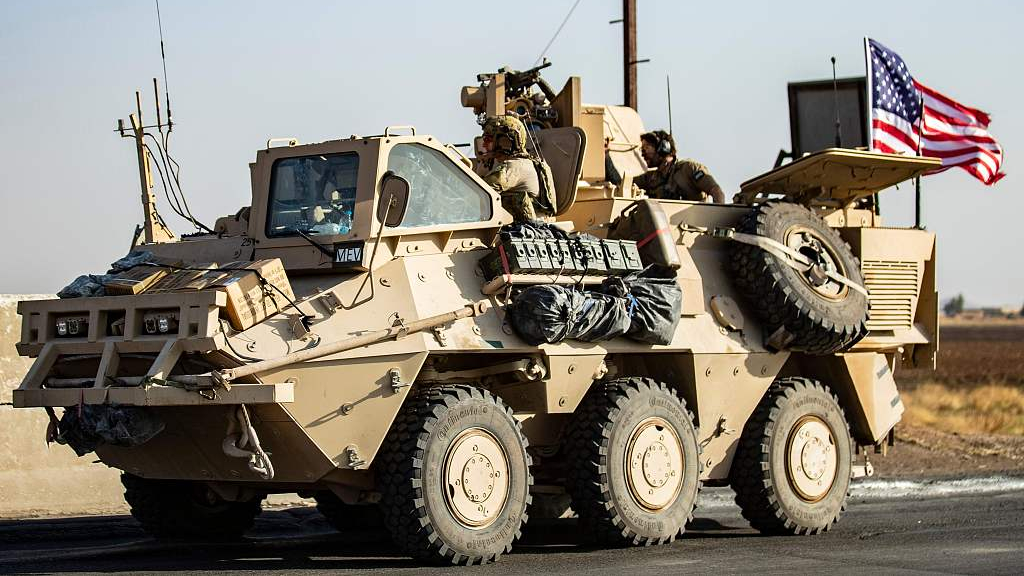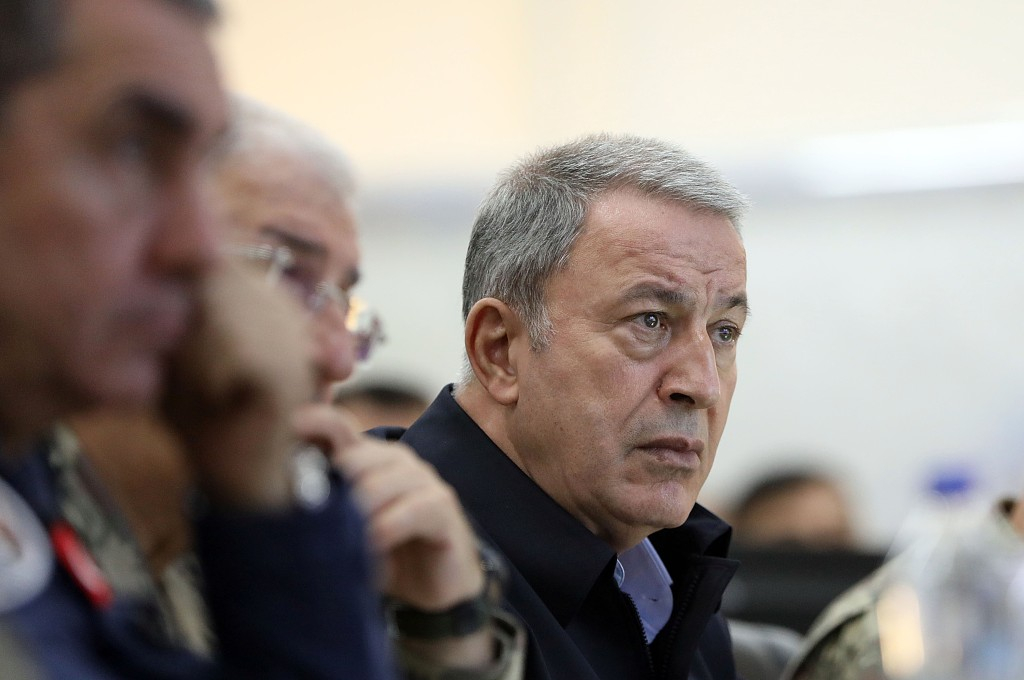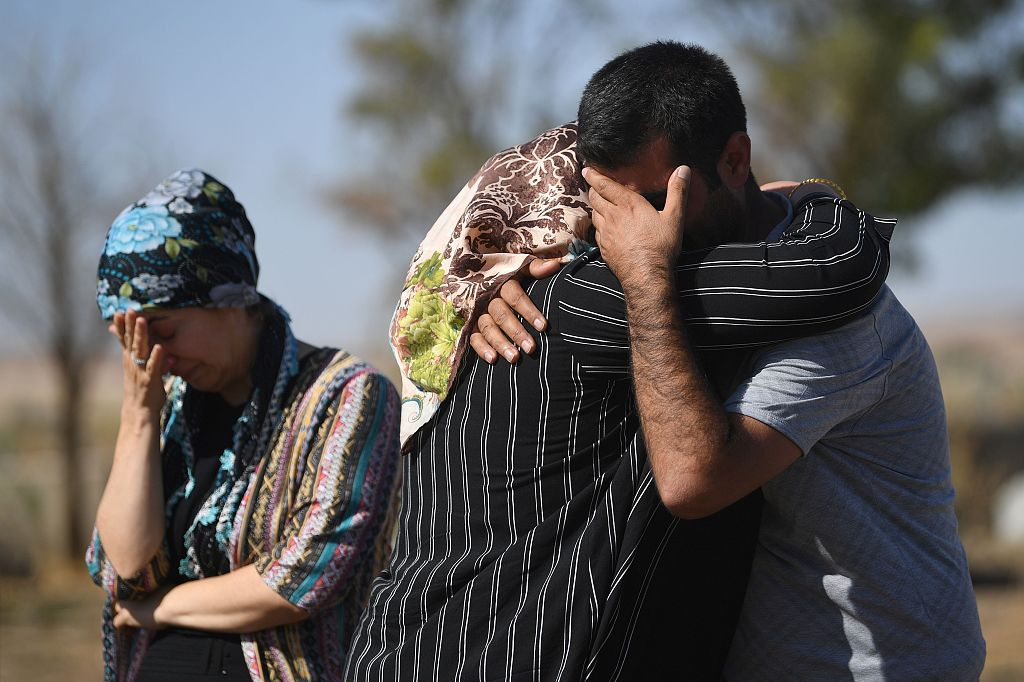
A U.S. military vehicle patrols a road near the town of Tal Baydar in the countryside of Syria's northeastern Hasakeh province, October 12, 2019. /VCG Photo
A U.S. military vehicle patrols a road near the town of Tal Baydar in the countryside of Syria's northeastern Hasakeh province, October 12, 2019. /VCG Photo
Editor's Note: Tom Fowdy is a British political and international relations analyst and a graduate of Durham and Oxford universities. He writes on topics pertaining to China, the DPRK, Britain and the United States. The article reflects the author's opinions and not necessarily the views of CGTN.
As Turkey's operation in north Syria wages on, Trump proclaims on Twitter that he wants to end "needless wars!" On the other hand, the broader American political system and foreign policy order continues to criticize him as the crisis in the country unfolds, with Ankara having already shelled U.S. positions by accident, with civilians displaced and reports circulating concerning the attempted escape of the ISIL prisoners.
Senators are calling for sanctions against Turkey, whilst several European countries have already prohibited the sale of arms to their NATO ally.
Both sides have a point here. The United States has, for a long time, been invested too much in the Middle East. However, the initiation of yet another crisis is not by any stretch the appropriate point of departure.
Instead, as critics of Trump note, the consequences of Turkey's will only prove to further destabilize the region and potentially lay the foundations for another "U.S. intervention" in the future.
This builds into a wider point concerning American foreign policy that the Middle East is an endless quagmire and distraction to its broader agenda which drains its focus, resources and manpower.
In some ways, it is self-defeating, because the aftermath of many U.S. interventions have in fact merely laid the foundations for a new crisis, sucking them in again.

Turkish National Defense Minister, Hulusi Akar (C), views the current status on Operation Peace Spring at the Operation Center in Sanliurfa, Turkey, October 12, 2019. /VCG Photo
Turkish National Defense Minister, Hulusi Akar (C), views the current status on Operation Peace Spring at the Operation Center in Sanliurfa, Turkey, October 12, 2019. /VCG Photo
Whilst as previously discussed Trump green lighted Turkey's invasion as a distraction from his own political struggles, in doing so, he has deliberated a death kneel to his own foreign policy agenda. Washington has fallen into the Middle East Rabbit hole again.
In the past 30 years alone, the United States has undertaken the following pursuits in the Middle East: In 1991, it joined a UN coalition of forces in the Gulf War to liberate Kuwait from Saddam Hussein's annexation.
Throughout the 1990s, it then sought to maintain a no-fly zone and maximum sanctions against Iraq which involved continuous air missions.
Then in 2001, the war on terror became a new turning point laying the premise for a new war in Iraq whereby Saddam's regime was forcibly deposed.
However, this was where the real detrimental consequences began: The removal of Saddam's statist Arab nationalist regime unleashed an undercurrent of Sunni radicalism which led to the rise of Al-Qaeda in Iraq, who pursed a sectarian insurgency against the country's Shia majority.
This would not only prolong the U.S. military presence in the country, but eventually such would evolve into the group ISIL, thriving from instability in neighboring Syria, where the United States sought to support anti-government rebels. The result would see the U.S. and its allies forced to intervene yet again, thus leading us to where we are today.
The history is extensive. However, there is one clear message: that is, repeated military interventions have not been the antidote for infections within the Middle East. Instead they have been the virus and infection.
Repeatedly and excessively, Washington has rendered itself incapable of understanding regional sensitivities including complex ethnic and sectarian divisions within weak state structures, which have only been further empowered by chaos, instability and opting for conflict.

Relatives mourn for people killed in a mortar attack in Suruc near northern Syria border, October 12, 2019. /VCG Photo
Relatives mourn for people killed in a mortar attack in Suruc near northern Syria border, October 12, 2019. /VCG Photo
The rise of ISIL, for example, did not occur in a vacuum; rather, it was nurtured by the very context of Washington's decision making.
The problem is however and thus repeatedly argued in Washington, that even if mistakes have been made, now at this point one cannot simply "withdraw" – as this in itself inflames new crisis and threats to global security, which perpetuates the cycle.
There are risks posed with withdrawal. Trump wants to stop "endless wars" – yet his decision to abruptly try and end U.S. engagement in Syria, approving a Turkish offensive into the country, was motivated by his desire not to act out of principle but to cause a distraction for his own political gain.
As a result, his critics point out the move has severe security implications, as the attack on the Kurds has effectively reignited the ISIL in Syria who proclaimed a "new operation" in the past few days as radicalized prisoners seek to escape and pursue insurgency again.
In this case, many have defended the status quo as providing security and stability. If he wanted out, he's failed to see the bigger picture.
Therefore, the Middle East "Merry Go Round" of crisis and chaos induced at the hands of Washington continues to spin. For a President who sought to fully recalibrate U.S. foreign policy, he has arguably made an incompetent mistake in opening up a new crisis simply to distract attention from his own impeachment.
In pursuing this short term goal under the claim of "ending needless wars," Trump has in effect undermined his entire foreign policy agenda and in turn, has made the timely mistake of his predecessors in making Middle East decisions which force obligation to new interventions.
The U.S. has fallen down the Middle East rabbit hole again.
(If you want to contribute and have specific expertise, please contact us at opinions@cgtn.com.)